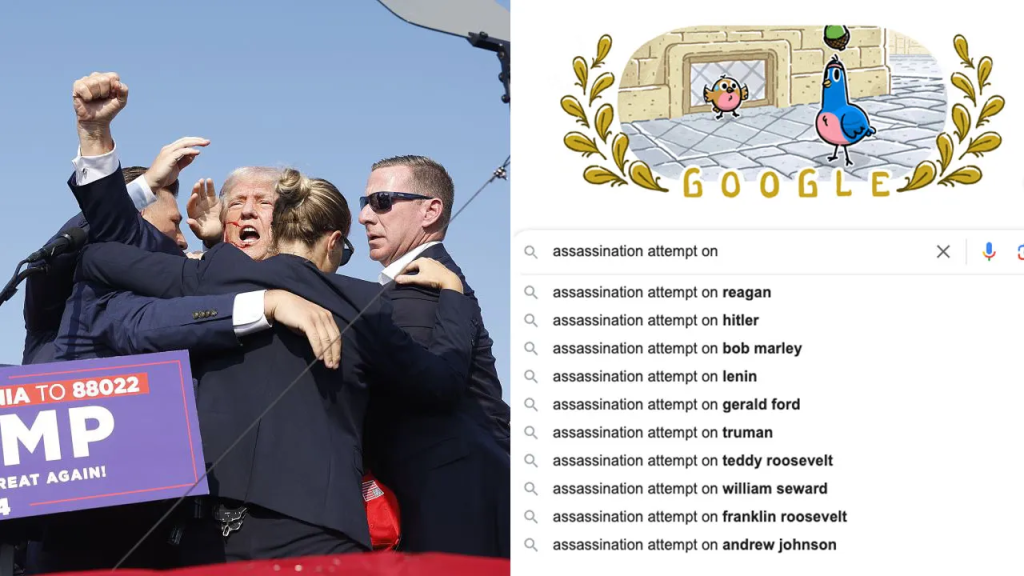Google’s Autocomplete Anomaly
When users attempted to search for terms like “assassination attempt on Trump,” the autocomplete function yielded no suggestions. Instead, it offered results for other historical figures, such as Ronald Reagan and Harry Truman. Many users took to social media to express their outrage, accusing Google of intentional manipulation to influence the upcoming presidential election. Donald Trump Jr. voiced his concerns on X (formerly Twitter), stating, “Big Tech is trying to interfere in the election AGAIN to help Kamala Harris. We all know this is intentional election interference from Google. Truly despicable.”
Billionaire Elon Musk also chimed in, posting a screenshot that showed Google suggesting “President Donald Duck” and “President Donald Regan,” but omitting “President Donald Trump.” Musk questioned whether Google had placed a search ban on the former president, implying election interference.
Google’s Response to Allegations
In response to the backlash, a Google spokesperson clarified that no manual actions had been taken to alter autocomplete predictions. They explained that their systems include protections against autocomplete predictions related to political violence, which were functioning as intended following the tragic shooting incident. The spokesperson emphasized that users can still perform searches for any terms they wish, despite the limitations of the autocomplete feature.
Google stated, “Following this terrible act, people turned to Google to find high-quality information—we connected them with helpful results and will continue to do so.” However, critics argue that the omission of search suggestions regarding the Trump assassination attempt is a troubling oversight, especially when compared to results for other political figures who have faced assassination attempts.
Political Reactions and Calls for Inquiry
The omission has not only drawn ire from Trump supporters but has also caught the attention of several Republican lawmakers. Senator Ted Cruz criticized Google for what he deemed “active election interference,” claiming the tech giant was “gas-lighting the American people and trying to erase the attempted assassination of Trump.” Senator Roger Marshall announced plans to launch an official inquiry into Google’s practices, questioning why the search for assassination attempt on Donald Trump yielded no suggestions.
The concerns raised by Trump and his supporters come amid broader allegations from conservatives that tech companies systematically silence conservative voices and manipulate search results. In 2021, Trump filed a lawsuit against Google and other social media platforms, alleging they unlawfully suppressed conservative content.
2024 Presidential Election Compromised By Silicon Valley Giant ?
As the 2024 presidential election approaches, tensions are high. With Kamala Harris officially entering the race and President Biden backing her candidacy, the political landscape is increasingly contentious. The stakes are particularly high for Trump, who seeks to return to the White House amid ongoing legal challenges and scrutiny over his past actions.
Musk’s commentary on the situation reflects a growing concern among many regarding the influence of technology companies on political discourse. With the proliferation of misinformation and deepfakes, the role of tech platforms in shaping public opinion and narratives is under intense scrutiny.
The controversy surrounding Google’s autocomplete search feature raises significant questions about the influence of Big Tech in the electoral process. As users and politicians alike demand transparency and accountability, the potential for election interference through search algorithms becomes a pressing issue. With the eyes of the nation on the upcoming presidential election, the implications of this incident could resonate far beyond the immediate fallout.

Whether Google’s practices are genuinely impartial or a veiled attempt to shape political narratives remains to be seen. And as the debate unfolds, it highlights the need for greater scrutiny of how information is disseminated and the responsibilities of tech giants in safeguarding democratic processes.


